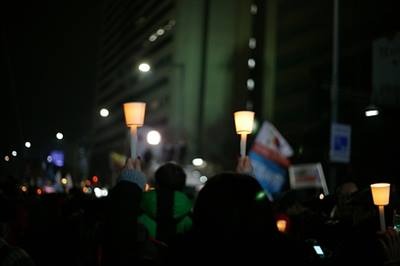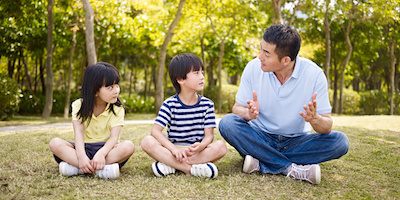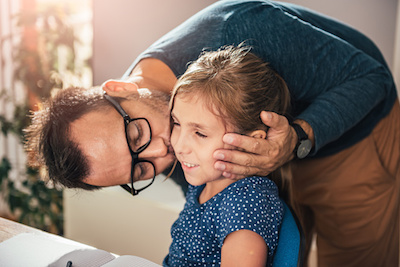How can you talk to your kids in the aftermath of tragedy?
It’s hard to know what to say amongst ourselves, but especially to our children, in the face of tragic events. What do we say when our kids see violent acts that have taken place splashed cross our television screens? It’s hard enough as an adult to make sense of such hateful acts, but what about our kids?
How do we talk to and support our kids through a tragedy?
Years ago, I stumbled across a quote from Fred Rogers, as in television’s Mister Rogers. It says,
When I was a boy and I would see scary things in the news, my mother would say to me, ‘Look for the helpers. You will always find people who are helping.” -Fred Rogers
I tucked that quote away in my mind and have thought of it every time a senseless act of violence takes place that has to be talked about. I find myself looking for the helpers.
Look for the helpers
Along with senseless acts of violence and the scenes of destruction, there are always those in the midst of the tragedy who helped and supported each other through the horrific chain of events that occurred. There are also police officers who have risked their lives to put a stop to the violence and the doctors, nurses, EMTs, and medical staff who have worked tirelessly to save lives. There are the leaders who have provided strength, encouragement, and hope to a shaken city.
And yet, there are even more helpers to be found. You will often hear firsthand accounts of bystanders, regular people just like you and me, who have gone above and beyond to show compassion and provide care for the people who are suffering.
 When the Pulse tragedy occurred here in Orlando on Saturday June 12th, 2016, there were more than 1,000 people standing in line to donate blood on Sunday morning, the day after the attack occurred. Midday Monday, the lines were still going strong. There were the people that brought snacks, drinks, and sunscreen to the people waiting in those lines. There were people that shared updates on and requests about friends and family on social media.
When the Pulse tragedy occurred here in Orlando on Saturday June 12th, 2016, there were more than 1,000 people standing in line to donate blood on Sunday morning, the day after the attack occurred. Midday Monday, the lines were still going strong. There were the people that brought snacks, drinks, and sunscreen to the people waiting in those lines. There were people that shared updates on and requests about friends and family on social media.
During the Manchester tragedy, residents quickly took to social media to offer #RoomforManchester, offers to house stranded concert-goers when the city's transportation options were closed. There are people organizing mental health counseling, vigils and memorials. The list goes on and on. These people are our helpers. These are the people and events we want our kids to see and to know about.
t is powerful. It is strong. It is love.
Fred Rogers’s mother was right. Finding the helpers brings our children peace. Finding them reminds the kids that there are good people in this world, people that will risk their lives to save others, people who will give their time, their money, their wisdom, and their kindness to bring comfort and help to others.
A few more thoughts on how to help kids
For those children directly affected by tragedy, their needs will be unique. They will be grieving and will need time and support to recover. There is a good chance that they will benefit from counseling, either in groups or individually. This will give them the opportunity to express their concerns and feelings. In group counseling settings, they will be able to connect with others who have had similar experiences.
For kids who have not experienced the trauma personally, but are exposed to talk amongst their friends, images on television or news shows or overheard conversations between the adults in their lives, there are some things you can do to help them process the information they are seeing and hearing.
Talk about it
 Kids may or may not come to you to talk. Take the lead and provide them with a brief explanation about what is going on. That may be all they need to know. If your child has questions, answer them. Use your judgment and common sense. Kids don’t need to know what they don’t need to know, but they may be curious about “why” and “how” something like this could happen. Honest, open and careful dialogue is best. A five-year-old is going to want to know different things than a 12-year-old. Giving age-appropriate answers and information is best. Be mindful of your television and internet use. Some kids may be frightened by images that they see on T.V. and limiting their access to that information will be helpful to them.
Kids may or may not come to you to talk. Take the lead and provide them with a brief explanation about what is going on. That may be all they need to know. If your child has questions, answer them. Use your judgment and common sense. Kids don’t need to know what they don’t need to know, but they may be curious about “why” and “how” something like this could happen. Honest, open and careful dialogue is best. A five-year-old is going to want to know different things than a 12-year-old. Giving age-appropriate answers and information is best. Be mindful of your television and internet use. Some kids may be frightened by images that they see on T.V. and limiting their access to that information will be helpful to them.
Tell them they are safe
 Remind kids that they are safe and that adults at their homes, schools, and summer camps are always working to keep things as safe as possible. Are we living in a world that seems to be getting more and more violent? It certainly feels that way, but regardless of that, our kids will likely continue to live life as normal. As parents, we might be on high alert. We might feel the need to be extra vigilant and aware in the coming months and going forward, but our kids don’t need to live in unnecessary fear.
Remind kids that they are safe and that adults at their homes, schools, and summer camps are always working to keep things as safe as possible. Are we living in a world that seems to be getting more and more violent? It certainly feels that way, but regardless of that, our kids will likely continue to live life as normal. As parents, we might be on high alert. We might feel the need to be extra vigilant and aware in the coming months and going forward, but our kids don’t need to live in unnecessary fear.
Let them express their feelings and concerns
Encourage your child to talk to you. Some sadness, worry, and anger is normal. However, if these feelings persist for a long period of time, your child may need extra support from a mental health professional. This is not unusual. It is better for kids to have the opportunity to express their concerns and feelings, rather than be told to move on or “don’t worry about it.”
Care for their caregivers
Lastly, don’t forget about yourself. Caring for ourselves is just as important as caring for others. Seek out support and help for yourself as you grapple with yet another horrible, senseless tragedy. We are better moms and dads when we remember to meet our needs, as well as our kid’s needs.







